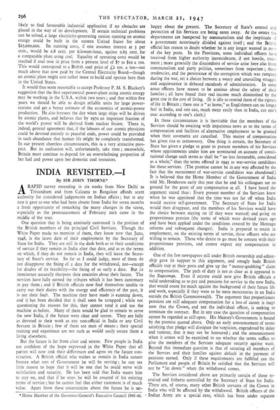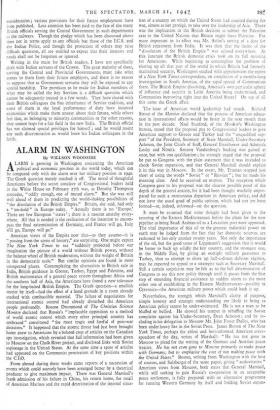INDIA REVISITED.-I
By SIR JOHN THORNE*
ARAPID survey extending in six weeks from New Delhi to Trivandram and from Calcutta to Bangalore affords scant authority for considered judgements on Indian affairs ; but at any rate it gave to one who had been absent from India for seven months a fresh opportunity of remarking the many changes in the scene, especially as the pronouncement of February 2oth came in the middle of the tour.
One question that is being anxiously canvassed is the position of the British members of the principal Civil Services. Though the White Paper made no mention of them, they know now that June, 1948, is the latest date of their employment by the Secretary of State for India. They are still in the dark both as to their conditions of set-vice if they remain in India after that date, and as to the terms on which, if they do not remain in India, they will leave the Secre- tary of State's service. So far as I could judge, most of them do not disapprove the fixing of a date for the withdrawal, nor—except for doubts of its feasibility—the fixing of so early a date. But its imminence naturally sharpens their anxieties about their future. The services have fully earned the tributes which it has been customary to pay them ; and if British officials now find themselves unable to carry out their duties with the energy and efficiency of the past, it is not their fault. The machine they have made is cunning down, and it has been decided that it shall soon be scrapped ; while not questioning the reasons for this, they cannot tend it and use the machine as before. Many of them would be glad to remain to serve the new India, if the future were clear and serene. They are fully as devoted to their work as any non-official in India or any Civil Servant in Britain ; few of them are men of means ; their special training and experience are not such as would easily secure them a living elsewhere.
But the future is far from clear and serene. Few people in India are confident of the hope expressed in the White Paper that all parties will now sink their differences and agree on the future con- stitution. A British official who wishes to remain in India cannot foresee what sort of Government he will be serving ; he can see little reason to hope that it will be one that he could serve with satisfaction and security. He has been told that India wants him to stay on, and that if he stays he will be assured of his existing terms of service ; but he cannot feel that either statement is of much value. Apart from these uncertainties about the future he is un-
* Home Member of the Governor-General's Executive Council 1945-46.
happy about the present. The Secretary of State's control and protection of his Services are being eaten away. At the centre the departments are hampered by communalism and the ineptitude of a government notoriously divided against itself ; and the British official has reason to doubt whether he is any longer wanted in mo-: of the key posts. In the Provinces, some individual officers have received from higher authority inconsiderate, if not hostile, treat- ment ; more generally the discomforts of service arise here also from communalism and party politics, sometimes from nepotism ; these tendencies, and the persistence of the corruption which was rampant during the war, set a choice between a weary and unavailing struggle and acquiescence in debased standards of administration. In some areas officers have reason to be anxious about the safety of their families ; all have found their real income much diminished by the great rise in the cost of living. (It is idle to remind them of the rigours of life in Britain ; there one is " at home," as Englishmen can no longer feel in India, and one can, much more easily than in India, cut one's coat according to one's cloth.) In these circumstances it is inevitable that the members of the Services should be awaiting with impatience news as to the terms of compensation and facilities of alternative employment to be granted when their covenants are cancelled. This matter of compensation has given rise to controversy. One thing is certain, the Secretary of State has given a pledge to grant to present members of his Services whose appointments under him are terminated on account of consti- tutional change such terms as shall be "no less favourable, considered as a whole," than the terms offered in 1945 to war-service candidates for those services. (The promise cannot be in any way affected by the fact that the recruitment of war-service candidates was abandoned.) It is believed that the Home Member of the Government of India told Mr. Henderson early this year that he and his colleagues see no ground for the grant of any compensation at all. I have heard the argument stated thus: Every present member of the Services knew when he was appointed that the time was not far off when India would receive self-government. The Secretary of State for India would then disappear, and the members of his Services would have the choice between staying on (if they were wanted) and going on proportionate pension (the terms of which were devised years ago and have been applied under the conditions created by the Montagu reforms and subsequent changes). India is prepared 'to retain in employment, on the existing terms of service, those officers who are willing to remain. Those who desire to go must be content with their proportionate pensions, and cannot expect any compensation in addition.
One of the few newspapers still under British ownership and editor- ship gave its support to this argument, and smugly bade British officials stay at their posts and give up the " money-grabbing " claim to compensation. The path of duty is not as clear as it appeared to the Statesman. Even if anyone could now give British officials a valid undertaking as to pay and pensions for service in the new India, that would count for much against the background of their future life and work, especially if they were to be mere mercenaries in an India outside the British Commonwealth. The argument that proportionate pensions are still adequate compensation for a loss of career is inept now that the Crown, and not the individual officer, is seeking to terminate the contract. But in any case the question of compensation cannot be regarded as still open. His Majesty's Government is bound by the promise quoted above. Only an early announcement of terms satisfying that pledge will dissipate the 'suapicion, engendered by delay and rumour, that it may not be honoured ; and the announcement when it comes will be examined to see whether the terms suffice to give the members of the Services adequate security against want. Beyond this immediate question is that of securing all members of the Servces and their families against default in the payment of pensions earned. Only if these requirements are fulfilled can the Parliament and people of Britain be satisfied that the Services will not be " let down " when the withdrawal comes.
The Services considered above are primarily certain of those re- cruited and hitherto controlled by the Secretary of State for India. There are, of course, many other British servants of the Crown in India who will be affected by the withdrawal. British officers of the
• Indian Army are a special case, which has been under separate consideration ; various provisions for their future employment have been published. Less attention has been paid to the fate of the many British officials serving the Central Government in such departments as the railways. Though the pledge which has been discussed above does not in terms apply to any officials but those of the I.C.S. and the Indian Police, and though the protection of others may raise difficult questions, all are entitled to expect that their interests and needs shall not be forgotten or ignored.
Writing in the main for British readers, I have not specifically dealt with Indian servants of the Crown. The great majority of these, serving the Central and Provincial Governments, must take what comes to them from their future employers, and there is no reason to suppose that as Government servants they will be exposed to any special hardship. The provision to be made for Indian members of what may be called the key Services is a difficult question which cannot be adequately treated in a few words. They have shared with their British colleagues the fine inheritance of Service tradition, and some of them in the loyal performance of duty have incurred animosities which make them uneasy about their future, while others feel that, as belonging to minority. communities or for other reasons, they cannot hope for a fair field in the new India. The British official has not claimed special privileges for himself ; and he would resent any such discrimination as would leave his Indian colleagues in the lurch.



































 Previous page
Previous page